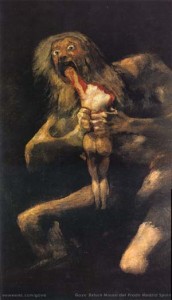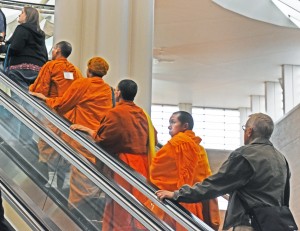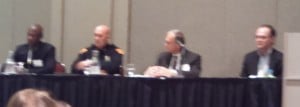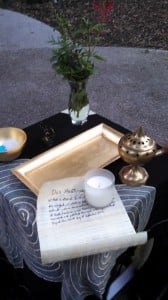My invitation came by email, though I wasn’t sure from whom. I pinged a Muslim friend and learned she was going to attend so I turned in my rsvp, “yes.” But what was a Pre-Ramadan dinner? Should I wear a veil? Would I have to take my shoes off? Would the program be long and boring? Would we have to wait until sundown to eat – oh no, thank goodness Ramadan did not start until the following morning.
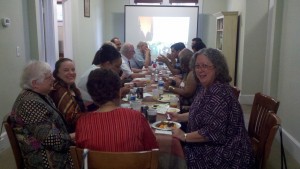 The event turns out to have been a program of the S.C. Dialogue Foundation who are primarily Turkish. It was quite pleasant, with an eclectic mix of guests, perhaps ¾ of whom were not Muslim. We all visited around for a bit while the hosts scurried to finish putting dinner in place. We watched about a five-minute powerpoint about the five pillars of Islam and then spent our remaining time just talking, making new friends, swapping business cards and email addresses, and enjoying delicious foods for which I have no name (but which did not prevent me from sampling with abandon).
The event turns out to have been a program of the S.C. Dialogue Foundation who are primarily Turkish. It was quite pleasant, with an eclectic mix of guests, perhaps ¾ of whom were not Muslim. We all visited around for a bit while the hosts scurried to finish putting dinner in place. We watched about a five-minute powerpoint about the five pillars of Islam and then spent our remaining time just talking, making new friends, swapping business cards and email addresses, and enjoying delicious foods for which I have no name (but which did not prevent me from sampling with abandon).
Why does a busy Pagan with a full life take time to go to a strange address to eat dinner with people I’ve never met and let them talk to me about their religion? Several things come to mind: first, curiosity, that’s a big one. I want to know everything about everything. I want to understand what makes “those people” think the way they do. I can see they are not so different from me, so what is it that they get out of their religion that just doesn’t do it for me? Oddly, the fear that some people have of interfaith is that it may lure them away from their present religion. Those of us who are involved know that the opposite is usually true. The fresh perspective found in other religions and spiritualities flexes my mind, brings me fresh insight, and leaves me better-grounded in my own faith.
I also go to these things because of the for-me-adventurous food. Feed me and I will come. All kinds of good things happen over food, from laughter back in the kitchen, to the relaxed mood over dinner which leads to heartfelt conversation. I was grateful that our hosts were at ease having a crowd in for a meal. They knew how to make us comfortable, they did not clump up with people they knew and ignore newcomers. With a Turkish engineer who is finishing his PhD here, I discussed the remarkable temple ruins found in Urfu. With my girlfriends Zara and Cheryl (Muslim and UU) we talked about exceptions from fasting, like when you are pregnant, nursing or during your menstrual cycle (also if you are sick, disabled, etc.), and how you can make up the time later in the year, if you wish. We briefly compared the depravation of fasting to the practice of ordeal (e.g., piercing, suspension) by some Pagans and Hindus. I did learn that Muslim fasting is overtly intended to imprint in you the feeling of hunger so that you will always feel compassion for the poor and hungry around you. Charitable giving for the year happens during Ramadan, and it is a percentage of your assets, not your income, and it has to be for immediate human need, like hunger or shelter. Even the Turkish protestors sat down at long “tables” in the streets to share a meal together at sundown last night.
Islam has been the most difficult religion for me to get comfortable with since becoming involved with interfaith. There are some large cultural divides between even moderate Muslim practice and much of who I am as a Pagan. But by deliberately choosing to look for friendships with each other, my Muslim friends and I are learning to live out the slogan on my car bumper, “Coexist.” Coexistence doesn’t mean we understand everything or agree on much. Rather, we are learning a subtle but beautiful dance which enables us to enjoy new relationships with each other. And if we are paying attention, we learn from each other.
A friend made the comment to me recently, “I’m just not cut out for interfaith work.” I replied that I derive a pleasure from it which is similar to visiting new places. It’s like a regular habit of travel, except that my new places are people in all their countless permutations of spirituality, culture, religion, ethnicity, belief, practice, costume, and life experience. And who doesn’t like to travel?



